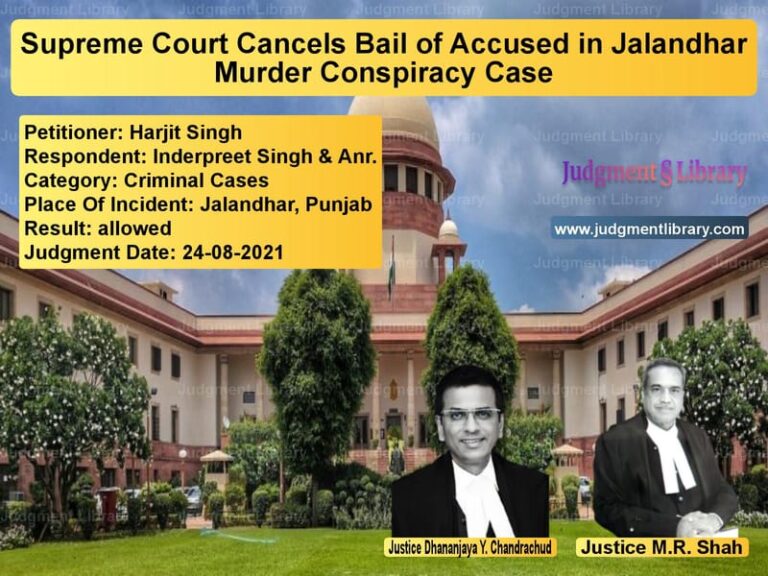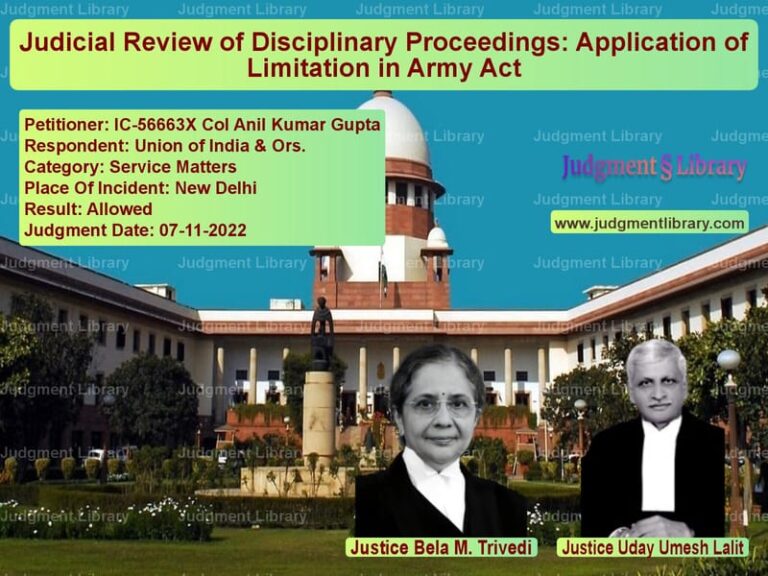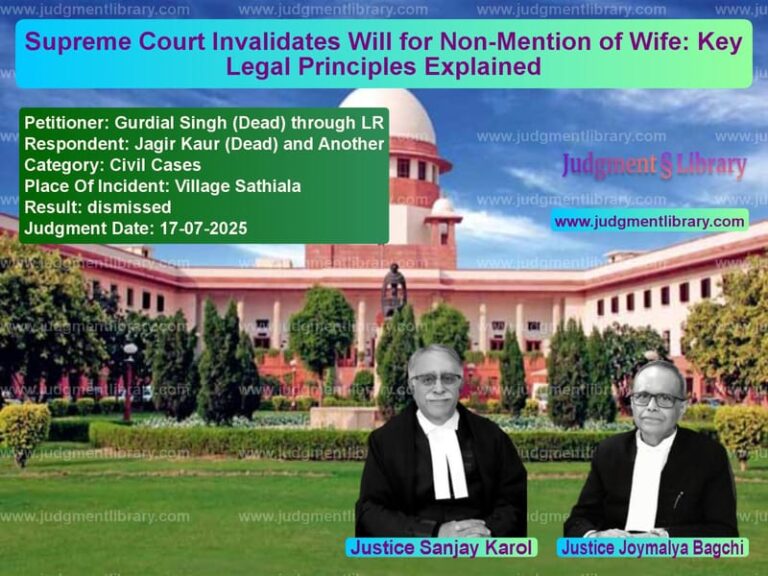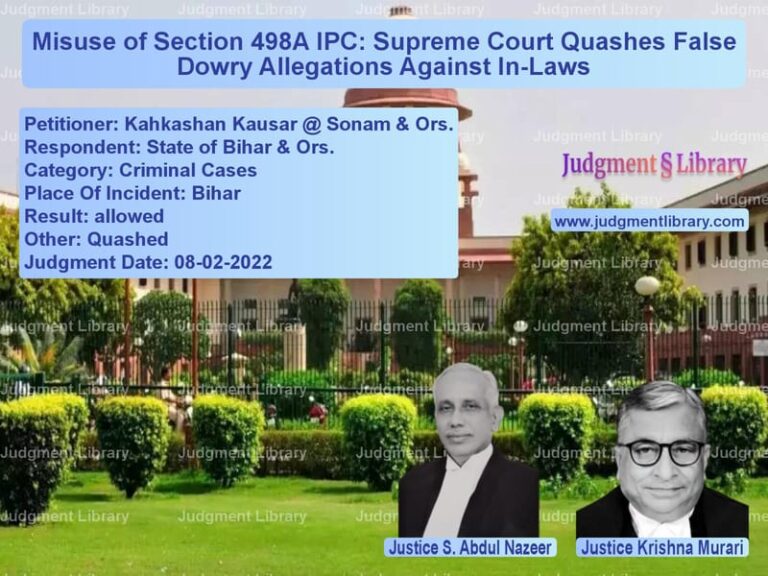Supreme Court Quashes Case Against Kerala Nuns Under Section 228A IPC
The Supreme Court of India, in The State of Kerala v. Sister Amala & Anr., addressed a significant case involving Section 228A of the Indian Penal Code (IPC), which deals with the disclosure of the identity of victims of sexual offenses. The case involved two nuns accused of violating this provision by allegedly revealing the identity of a rape victim on social media. The Court, while upholding the importance of Section 228A, ultimately decided to quash the proceedings against the respondents, citing the passage of time and changed circumstances.
Background of the Case
The case originated from Crime No. 1012/2018 of Kuravilangadu Police Station, Kerala. The respondents, Sister Amala and another nun, were accused of violating Section 228A IPC by disclosing the identity of a rape victim in a case registered under Sections 342, 376(2)(k), 376(2)(n), 376A, and 506 IPC.
The First Information Statement (FIS) alleged that the respondents had shared a photograph of the victim on a social media platform, WhatsApp. However, the police investigation revealed that the respondents had actually sent an email containing the victim’s details to three unnamed journalists. This led to the filing of a final report under Section 173(2) CrPC, and the case was taken up as S.T. No. 4981/2019 in the Judicial First Class Magistrate Court-I, Pala.
Petitioner’s (State of Kerala’s) Arguments
The State of Kerala challenged the Kerala High Court’s order quashing the case and presented the following arguments before the Supreme Court:
- Section 228A IPC was enacted to prevent the social victimization and ostracization of victims of sexual offenses.
- The accused had violated this provision by disclosing the identity of the victim through electronic means.
- The Kerala High Court had erred in quashing the proceedings at the pre-trial stage.
- In Nipun Saxena v. Union of India, the Supreme Court held that no person should disclose the identity of a sexual offense victim in print, electronic, or social media.
Respondents’ Arguments
The respondents, Sister Amala and another nun, countered the State’s claims with the following arguments:
- Their actions did not constitute a violation of Section 228A IPC as they had not publicly shared the victim’s identity.
- They had only sent an email to a limited number of media professionals, which does not amount to ‘publication’ as defined under the law.
- The Kerala High Court had correctly quashed the case as there was no prima facie evidence of an offense.
- Four years had passed since the alleged offense, and there was no compelling reason to reopen the matter.
Supreme Court’s Key Observations
The Supreme Court made the following key observations in its judgment:
- Scope of Section 228A IPC: The Court emphasized that the provision is intended to protect the dignity and privacy of victims of sexual offenses.
- Publication and Disclosure: While Section 228A prohibits disclosure, the Court noted that the respondents had not ‘published’ the identity in a public forum but had sent an email to a few individuals.
- Passage of Time: The Court took into consideration that four years had passed since the incident, and reopening the case at this stage would serve no constructive purpose.
- Impact on Religious Identity: The Court acknowledged that the respondents, being nuns, had a different socio-religious standing, and prolonged litigation might result in unnecessary harassment.
Supreme Court’s Judgment
The Supreme Court dismissed the State of Kerala’s petition, affirming the Kerala High Court’s decision to quash the case. The key directives included:
- The case against the respondents under Section 228A IPC was quashed.
- The Court reiterated that while Section 228A IPC is an important legal safeguard, its application must be balanced against procedural fairness.
- Prosecution in such cases must be based on clear and compelling evidence, which was lacking in the present case.
Impact of the Judgment
This ruling has significant implications for legal proceedings involving Section 228A IPC and the balance between victim protection and procedural justice:
- Clarification on ‘Publication’: The judgment provides clarity on what constitutes ‘publication’ under Section 228A IPC.
- Safeguarding Press and Whistleblowers: The ruling sets a precedent that internal communications do not necessarily constitute unlawful disclosures.
- Judicial Discretion in Quashing Proceedings: The case underscores the importance of judicial discretion in quashing cases where prolonged litigation would be unjustified.
- Protection of Religious Figures in Litigation: The judgment acknowledges the unique social standing of religious figures and the potential for litigation to be misused for harassment.
Conclusion
The Supreme Court’s judgment in The State of Kerala v. Sister Amala & Anr. reaffirms the principle that Section 228A IPC must be applied judiciously. While protecting the identity of sexual offense victims is of paramount importance, the Court recognized that criminal proceedings should not be pursued without clear evidence of wrongdoing. By quashing the case, the Court upheld the balance between privacy rights and fair legal procedures, setting an important precedent for future cases involving Section 228A IPC.
Read also: https://judgmentlibrary.com/supreme-court-allows-informants-plea-in-karnataka-murder-case/
Petitioner Name: The State of Kerala.Respondent Name: Sister Amala & Anr..Judgment By: Justice Ajay Rastogi, Justice C.T. Ravikumar.Place Of Incident: Kerala.Judgment Date: 05-08-2022.
Don’t miss out on the full details! Download the complete judgment in PDF format below and gain valuable insights instantly!
Download Judgment: the-state-of-kerala-vs-sister-amala-&-anr.-supreme-court-of-india-judgment-dated-05-08-2022.pdf
Directly Download Judgment: Directly download this Judgment
See all petitions in Criminal Defamation
See all petitions in Bail and Anticipatory Bail
See all petitions in Legal Malpractice
See all petitions in Judgment by Ajay Rastogi
See all petitions in Judgment by C.T. Ravikumar
See all petitions in dismissed
See all petitions in supreme court of India judgments August 2022
See all petitions in 2022 judgments
See all posts in Criminal Cases Category
See all allowed petitions in Criminal Cases Category
See all Dismissed petitions in Criminal Cases Category
See all partially allowed petitions in Criminal Cases Category







